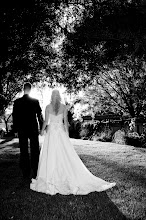Above all, remember that while some consider a cash bar poor etiquette, it is not at all rude to have a completely dry wedding, and is not uncommon here in North Carolina. If you can't afford alcohol or don't wish to have it at your wedding for whatever reason, don't allow yourself to be steamrolled by friends or relatives. If they wish to drink, they can arrange (and pay for) an after-party.
- Sometimes you need to spend money to save money. If your reception venue doesn't provide one or if you are having an outdoor wedding, hire a licensed bartender. A licensed bartender will pay for himself by preventing problem guests from over-indulging, which both saves money and reduces the likelihood of "incidents". He or she may even keep you out of legal trouble. If you provide free-flowing alcohol, you can be held liable if one of your guests drives drunk and injures / kills somebody.
- Keep the bar open for only a couple of hours instead of all night.
- Limit your selection to one or two kinds of beer, one or two wines, and one or two "signature mixed drinks," or skip hard liquor entirely for extra savings. What you don't want is a dozen half-empty bottles left over at the end of the night that you have to pay for.
- If you are providing the alcohol yourself, shop around well before the big day to find the best deals. If you are serving beer, buy cases from a bulk grocery like Sam's Club or Costco, or a bulk ABC store like Total Wine, instead of buying a keg. Kegs are messy, the extra accessories can add up, and the cost works out to be about the same per-drink for bulk cases versus a keg. Be sure everything is at the reception site several hours early so it can be properly chilled.
- Your venue will limit what you can do. Hotels and country clubs usually have liquor licenses, meaning you have the option of a cash or a free bar. Other venues, like churches, are sometimes completely alcohol-free or only allow certain types of alcohol (no mixed drinks, for example). Almost every venue will charge extra fees for bringing in alcohol.
 Let me describe a scene that plays out at least three times per season. A bride comes to me midway through her planning, about six months before her wedding. She has already placed a substantial, non-refundable deposit on a banquet hall. The hall is great, the only problem? The chairs that come with the hall are hideous. She comes to me because she wants to make her wedding look good in spite of the chairs.
Let me describe a scene that plays out at least three times per season. A bride comes to me midway through her planning, about six months before her wedding. She has already placed a substantial, non-refundable deposit on a banquet hall. The hall is great, the only problem? The chairs that come with the hall are hideous. She comes to me because she wants to make her wedding look good in spite of the chairs. sure they fit the ugly chairs in question. Your banquet hall may have chair covers available for an extra fee, or will probably know a place that carries chair covers that fit their awful chairs. If that's no go, borrow an ugly chair for the day and find a party rental store with covers that fit. If you're in the Raleigh area, A Special Event has chair covers to fit some folding chairs, and Deejays has chair covers to fit round back
sure they fit the ugly chairs in question. Your banquet hall may have chair covers available for an extra fee, or will probably know a place that carries chair covers that fit their awful chairs. If that's no go, borrow an ugly chair for the day and find a party rental store with covers that fit. If you're in the Raleigh area, A Special Event has chair covers to fit some folding chairs, and Deejays has chair covers to fit round back 


